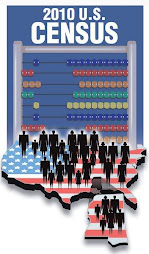Gary Pettus of the Clarion Ledger writes about Census obstacles...
Census obstacles - Isolated areas in state pose challenge for listers
When Stephen Guido pilots his chopper above the remote terrain along the Mississippi River, he's often searching for a flood victim, looter or something more sinister.
"Most of the time, it's looking for dead bodies," said Guido, a reserve officer in the Adams County Sheriff's Department.
But earlier this week, Guido and his copter were on a mission to find the living.
As he mounted the skies over Glasscock and Jackson islands, he carried two passengers: Adams County residents Latonya Terrell and Karen Rounds, who both work as "listers" for the Jackson office of the U.S. Census Bureau.
Along the river at Natchez, Guido was helping them search for houses or habitable buildings -a preliminary step in the 2010 census.
The search was part of the bureau's effort to reach populations that are hard to count.
Among the 50 states, Mississippi is the 19th-hardest to count - often because of crowded housing or poverty.
But, for the area along the Mississippi-Louisiana border, including nearby Cowpen (a.k.a. Giles) Island, other factors are in play: high water and geography.
The marshlands and wooded areas of the county are hard to reach, said Donald Watson, office manager of the Census Bureau's Jackson office, which covers the states' western half.
"We have had to come up with creative ways to get the job done," he said.
In June, low-lying parts of Cowpen/Giles Island were still under water from spring floods, said Stan Owens Jr., director of Emergency Management in Adams County.
Facing a deadline, Watson's workers had to find a way in and complete the address canvassing process: verifying the addresses of single-family dwellings.
Across the country, listers start with address lists taken from previous censuses and the U.S. Postal Service.
Once addresses are confirmed or corrected, and new ones discovered, the bureau uses the new lists to mail out questionnaires to residents.
Seeking help on this mission, Watson called Adams County Sheriff Angie Brown. In June, she offered him a search-and-rescue boat.
"The census is important to our state and to our community," Brown said. "Without accurate counts, a lot of federal money could be lost."
The count affects federal funding for schools, hospitals, roads and more. It determines a community's share of an estimated $300 billion.
It also determines a state's representation in Congress: After the 2000 census, Mississippi lost a U.S. House seat because its pace of growth was slower than in other states.
So, about a month ago, Everard Baker and two other volunteers with the county's search-and-rescue team climbed into the unit's 17-foot, fiberglass outboard.
With three census listers aboard, the team navigated the swift-running waters of the Mississippi, toward Cowpen/Giles Island.
On a map, this isolated area falls on the Louisiana side of the river, but it belongs to Adams County. Cowpen was detached decades ago when the U.S. Army Corps of Engineers created a cutoff to shorten a river bend.
This region is dotted with hunting and fishing camps, and a smattering of homes. While a road does connect Cowpen to the mainland, parts of it are still flooded or mud-swamped.
"The (census workers) couldn't get to some of these places," Baker said, "so we carried them there to let them do whatever they do. Count buildings, count heads.
"We're here to provide a public service. If that helps them get their job done, we've accomplished our mission."
Still, because of high water and their remoteness, two other sites, Jackson and Glasscock islands, are difficult to survey, even by boat.
That's why Brown offered Watson the services of the Sheriff Department's chopper, mostly for free.
"It can cost $1,000 to hire a helicopter," Watson said, "but Sheriff Brown said, 'Y'all just buy the gas.' "
Brown did not have an estimate for the boat-fuel cost, but gauged the charge for the copter's fuel at around $200.
She described the arrangement as "win-win."
"It helped in the training of our all-volunteer search-and-rescue team," Brown said.
"Our helicopter pilot is a volunteer, also, and this gave him some air time. Pilots are always looking for air time."
Often, air time is spent buzzing suspicious-looking characters, Guido said.
"People break into these hunting and fishing camps.
"If we see someone in a boat, we'll stop and shake them down to make sure they haven't stolen anything."
There were no shakedowns Thursday, but once the listers landed on Jackson Island, or Point, they found five livable structures, Guido said. "This is the first time I've flown census people."
Without that kind of help, "We couldn't have canvassed these areas within our time frame," Watson said.
Officials in Bolivar and Wilkinson counties and other areas "stepped up to the plate" as well, he said.
"I've been pleasantly overwhelmed.
"There seems to be a renewed sense of patriotism, or something, from people of all walks of life."
The work isn't finished, of course. Next is the survey of group quarters - college campuses, military bases, nursing homes and more.
Three more census offices are scheduled to open by summer's end - in Southaven, Tupelo and Harrison County.
For now, there are offices in Jackson and Meridian only.
Their work leads up to the official 2010 census mail-out, which starts next year.
For the 2000 census, 63 percent of Mississippians responded to the mail-out, compared to 67 percent for the nation, Watson said.
"I'd like to see our rate reach 70 or 75 percent this time," he said. "That could mean millions of more dollars for the state of Mississippi."
Subscribe to:
Post Comments (Atom)

No comments:
Post a Comment